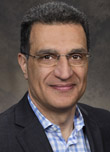Warning To U.S.-Based CDMOs: Don't Get Complacent

By Louis Garguilo, Chief Editor, Outsourced Pharma

How could I not ask him for an opinion regarding our vigorously pursued editorials on the WuXi Apptec–BIOSECURE Act.
It would be a disservice to readers not to.
After all, Reza Oliyai has outsourced a myriad of development and manufacturing services to hundreds of CDMOs around the world.
He did so for nearly three decades in leadership roles at Gilead, and since November of 2022, as the CEO of his eponymous consulting company. We covered much of that in part one.

Philosophically, they all hinge on this precept:
The means we employ to achieve our ends says a lot about who we are.
It is, therefore, correct to be on the “wrong” side of history by providing WuXi Apptec, an important CDMO in the global outsourcing milieu, at least the benefit of the doubt, while remaining resolutely on the “right” side of history against the behaviors of the China Communist Party.
So that’s prelude. Now Oliyai’s thoughts.
The Experienced Take
“My first thought," he says in a measured voice from his office in Atherton, California, "is that this is a complex topic." He went on:
"It would be unfair for any of us to assume we know or can judge everything related to WuXi’s relationship with the Chinese Communist Party. We simply don't know, and that's something we have to acknowledge from the start.
"But it's important to recognize that WuXi AppTec and other Chinese CDMOs have been extremely successful in building infrastructure in different modalities across the globe.
“If the efforts and investments of these companies, and their global footprint, are overlooked due to this Act by the U.S. government, it would result in significant shortcomings for many CDMOs here, in Europe, and in places like Japan and South Korea.
“WuXi has excelled in training high-quality scientists and maintaining a modality-agnostic approach within their infrastructure. This is something we should all recognize.
"Other CDMOs should not lose sight of the strategic investments WuXi has made in infrastructure.
The BIOSECURE Act should not serve as a lifeline for CDMOs in the US and Europe that haven't made adequate investments in their infrastructure, people, and technologies.
"The last thing I want to see is U.S. or E.U. CDMOs becoming complacent, feeling as if this legislation will save them. That would be shortsighted and unfortunate. They need to make their own investments.
Technologies and modalities are becoming more complex, and CDMOs must continue to invest. Don't think, 'We should come out of this stronger.' It would be a big mistake. Don't rely on the BIOSECURE Act as a lifeline. Invest in your business; invest in your people."
Risks All Around
Whether it’s a geopolitical situation or the rigors of drug development itself, the process of commercializing medicines is full of risks. We talk about those in these pages all the time.
Nobody developing new drugs and therapies in an outsourcing model should be adding risk because of supply-chain design.
“Certainly, there are potential intellectual property considerations, and we are mindful of any potential IP leakage and its implications for the Pharma and Biotech industry,” Oliyai says.
“That doesn't mean you should immediately cease working with WuXi or other Chinese CDMOs.
"What it does mean is that you must have risk mitigation plans in place in case this situation remains unresolved, or if this Act is enacted by Congress and signed by the president.
[UPDATE: The House Rules Committee did not include the BIOSECURE Act in the final list of amendments to be considered in the National Defense Authorization Act (NDAA) for Fiscal Year 2025. However, as I wrote earlier, “Nothing in government is etched in stone. Legislation comes, goes … but like a specter can appear again.”]
"Regardless of your perspective," Oliyai continues, "you cannot afford to be caught without a contingency plan. You will face inquiries from investors, the board of directors, and your own executive management about what steps you are taking."
He explains that his consultancy's professionals have been actively assisting clients in examining "supply chain redesign" so that drug developers can proactively engage with those boards of directors and investors.
"I cannot stress enough how much effort we've dedicated to this topic in the past months," Oliyai emphasizes. "We must acknowledge that this geopolitical situation is highly unpredictable for all of us at this time."
Lasting Concerns
Going back to my comments on the right and wrong arcs of history, going on the offense against unacceptable, illegal (and/or unethical) actions of the Communist China Party is what needs to continue.
However, creating a papier mâché policy to combat China -- which the WuXi section in the BIOSECURE Act comes off as, is unwelcome, and unnecessary.
I ask Oliyai if he’d been long concerned with outsourcing to China prior to the Act.
“One hundred percent concerned,” is the swift reply, in the sense that "too many sponsors concentrate too much of their development and cGMP manufacturing operations there.
"Instead, we emphasize the need for a robust risk-mitigation strategy. Some didn't heed our advice; now they are returning to reconsider."
Having said that, Oliyai circles back to his earlier statement.
"It's important to note that, at this juncture, nothing has fundamentally changed – to some extent, business can proceed as usual. Outsourcing manufacturing to China remains an option."
The latest version of the Act – currently on the legislation shelf – had provided biotech firms receiving federal funding until 2032 to sever ties with companies listed in the legislation.
"But just the perception that changes could occur is affecting many companies," notes Oliyai.
"Since our inception in November 2022, we've always been transparent with our clients that overreliance on China is not a sustainable supply-chain strategy. Now, we face this added complication."
This “complication,” today and tomorrow, can impact regulatory inspections, import decisions, reimbursement, among other components of our biopharma outsourcing industry.
Still, the concern that perhaps weighs most on Oliyai’s mind is the government’s limiting such strong competition like a WuXi Apptec will degrade the entire CDMO industry.
Some may take personal umbrage it that thought.
If they do, that’s probably a good sign. Nobody should get complacent.
